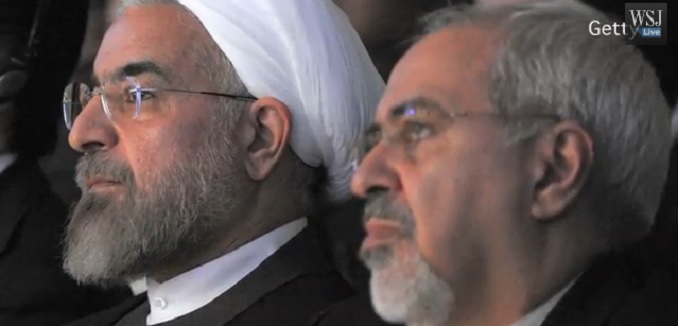Reuters yesterday conveyed statements from State Department spokeswoman Marie Harf confirming that the first round of comprehensive nuclear negotiations with Iran will begin in New York in mid-February, amid both news and analysis reflecting unease over the willingness and ability of Iranian president Hassan Rouhani to offer meaningful concessions.
“New York – agreed to by EU High Representative (Catherine) Ashton and Iranian Foreign Minister (Mohammad Javad) Zarif – has a similar support infrastructure to Geneva,” Harf said. “We believe that United Nations and international support is important for work on a comprehensive agreement.”
The Wall Street Journal yesterday evaluated interviews recently given to CNN by Rouhani and by Iranian foreign minister Javad Zarif, dryly noting that their intransigent tone and positions had “rekindled concerns in Washington and Europe about [Rouhani’s] ability to deliver” a robust agreement.
Many Iran analysts said the Rouhani delegation’s statements indicate the limited power it has inside Iran. Iran’s Supreme Leader Ayatollah Ali Khamenei is the ultimate arbiter on decisions involving the country’s nuclear program. And the Islamic Revolutionary Guard Corps, or IRGC, controls Iran’s Syria policy. “I think the Iranians’ comments reinforces the perception that Rouhani isn’t totally in control of his country’s national security,” said Oubai Shahbandar, a former U.S. Pentagon official who advises Syria’s opposition movement. “There is a divide between his words and actions.”
Zarif had explicitly accused the Obama administration of lying about Iranian commitments to dismantle nuclear centrifuges in the context of the current interim agreement, while Rouhani had ruled out dismantling centrifuges during any future agreement. The stance was quickly echoed, as Iranian media pointed out last Friday, by a senior Iranian cleric who cited statements from Iranian Supreme Leader Ayatollah Ali Khamenei. A report published last week by the U.S.-based Institute of Science and International Security (ISIS) had calculated [PDF] that Iran would minimally need to dismantle 15,000 centrifuges to verifiably put its atomic program beyond use for weaponization. Obama administration efforts to contain the fallout from the Iranian statements, which saw White House officials describing the CNN interviews as geared for domestic consumption, were literally, openly mocked by members of the White House press corps. The Associated Press had already assessed last week that the Rouhani and Zarif’s statements were set to “renew criticism that Iran is stalling and energize the push in Congress for tougher sanctions,” while Bloomberg columnist Jeffrey Goldberg noted that if Rouhani’s statement is sincere then “there is no possibility of a nuclear deal between Iran and the six powers.”
[Photo: WSJDigitialNetwork / YouTube]




